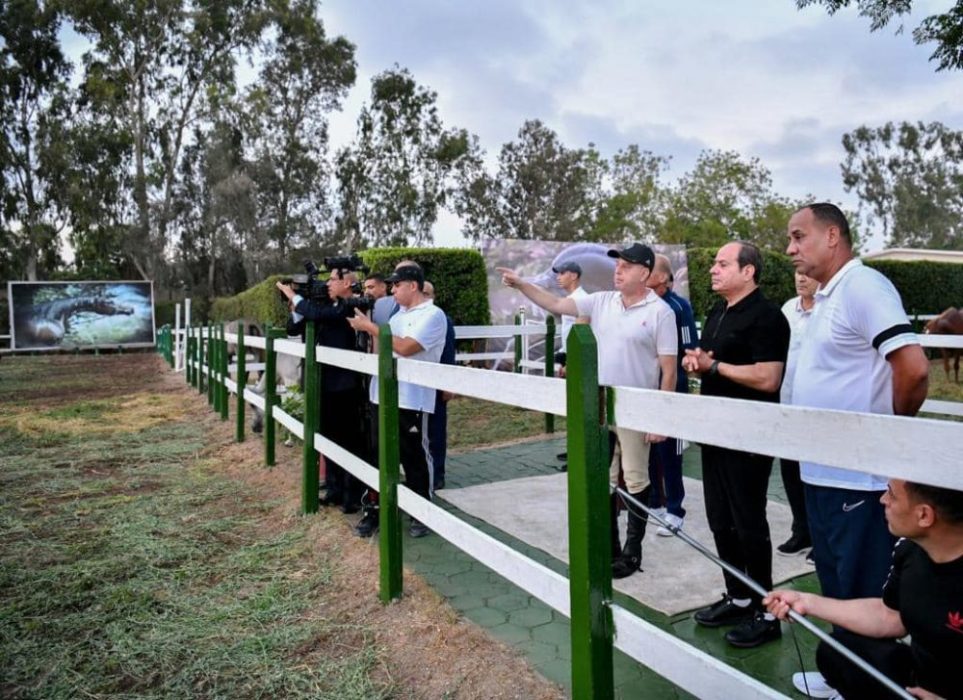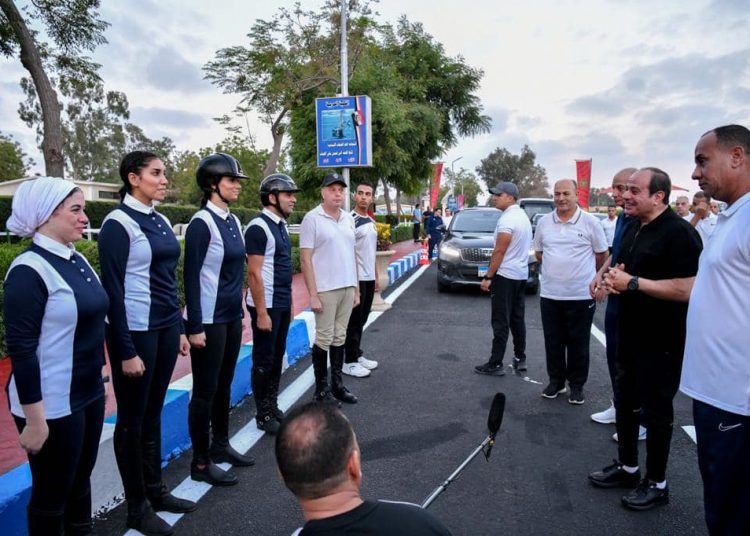Egypt’s President Abdel Fattah El Sisi stressed keenness on finding clear-cut solutions for the economic crisis and working hard in various sectors.
He asserted that the government is implementing a number of measures to alleviate the impact of the crisis.
He made the remarks at a meeting with Military Academy cadets during an inspection tour early Saturday.
The president said “We’re working on securing hard currency and will not stop securing basic needs.”
Sisi underlined that unprecedented efforts were exerted to expand arable lands.
He stressed keenness on securing strategic reserves of basic commodities for five to six months.

He added that Egypt’s foreign policy is balanced and is against interfere in others’ internal affairs, noting that Egypt seeks to play a positive role in settling regional crises.
He referred to Cairo’s hosting of a conference of Sudan’s neighbors to find a peaceful solution to the Sudanese crisis.
The president lauded the role played by the Military Academy.
He congratulated the academy’s graduates, wishing them all the best.
President Sisi highlighted the ongoing development efforts being carried out nationwide.
He made the remarks on the sidelines of his visit to the Military Academy early Saturday.
The president reassured citizens on the country’s situation, saying that development work has been going on regularly across the country.
As for people’s concerns, president Sisi said that the country managed to overcome past crises through hard work perseverance and persistence, noting that the current crisis was a repercussion of a global one.
Despite the current crisis and hiking prices of basic commodities, the state has exerted unprecedented efforts to expand its arable lands, the president said.
He added that throughout the few upcoming months, more than three million feddans will be added to Egypt’s agricultural map in New Delta, Sinai and West Owainat, yet, there will still be a need for importing some basic commodities like wheat and oil due to their high-consumption rate.
President Abdel Fattah El Sisi voiced deep appreciation of the efforts exerted by the Military Academy to qualify cadets, noting that he is closely following them up with the Armed Forces commanders and the academy director.
He underlined keenness in the continued development of the academy.

As for the economic crisis, the president noted that Egypt passed through many crises and overcame them through strenuous efforts, perseverance and patience.
He expounded that the economic crisis happened because of international circumstances negatively affecting the global economy, including the Russian-Ukrainian crisis.
Despite of the major crisis and rising prices of basic commodities, Sisi said huge swathes of lands will be cultivated for the reclaimed agricultural lands to reach over 3 million feddans, adding that this will realize an unprecedented agricultural leap in a brief period.
He expounded that Egypt consumes at least 18 to 20 million tons of wheat annually, noting that it produces only half of that amount and imports the rest, “therefore the prices go up”.
He added that Egypt imports over 90 percent of cooking oil.
“It is important to secure hard currency for importing commodities that meets all our needs, including staple food items, such as cooking oil and production inputs.
President Abdel Fattah El Sisi said the state works on securing fuel for over 10 million cars nationwide ever day noting that part of the amounts of fuel which the domestic market needs is imported.
He added that Egypt imports about 18,000 tons of diesel oil to operate power stations in light of the scorching summer heat, noting that about 300 to 350 million dollars are spent monthly to import 0.5 million tons of diesel oil.
He said “the state’s production of natural gas has largely contributed to catering for our needs,” adding that without this production, there would have been a great crisis.
He added that the government is working on a number of measures to alleviate the high prices crisis.
He said there is an ambitious plan for solving the economic and industrial crisis and reducing imports through finding local alternatives.
He added that the state needs hard currency for meeting essential needs such as getting petroleum products, industrial supplies and medicines, noting that efforts are under way to work out solutions, including through work, export and finding alternatives.






Discussion about this post